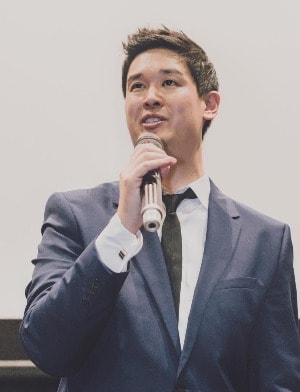What Does an Entertainment Lawyer Do?
Veteran attorney Dan Mark breaks down his gig and why privacy law is the future

“Just sign here” can be three of the scariest words an artist will ever hear.
It’s why entertainment lawyers exist, to navigate talented souls through the thicket of fame, wealth and career obstacles.
Entertainment attorney and film producer Dan Mark began at Greenberg Traurig in Los Angeles, and was later in-house counsel for Warner Bros. film studios.
He later joined the entertainment boutique law firm founded by his wife, Rachel Tan. They currently practice entertainment law together representing artists, producers, writers, directors and, more recently, digital influencers.
Mark goes above and beyond the entertainment lawyer’s job description.
He created his own film production company, King Street Pictures, bringing movies like “Heavenquest: A Pilgrim’s Progress,” “Snakehead” and “Fiction and Other Realities” to audiences worldwide.
HiT reached out to Mark to share a day in the life of an entertainment lawyer and how the digital age makes life as a social media superstar so challenging.
HiT: You’re stuck on an elevator and someone asks what you do for a living … what’s your response?
Dan Mark: I’m a film producer and entertainment lawyer. I make movies and represent filmmakers and others in the entertainment industry.
HiT: How did your career steer toward this aspect of the law, and what was the most challenging part earlier in your career?
Marks: I always wanted to work in film and entertainment. Years ago in college I had an internship in Physical Production at Universal Pictures, and the dream kind of stuck with me from there. I went to law school in D.C. and most of my friends were taking jobs with law firms on the East Coast.
I originally hailed from the Bay Area in Northern California, but I knew my heart was to come back to LA. So I took my first law firm job at a firm in LA that represented a lot of clients in the entertainment industry.
RELATED: VidAngel’s Legal Fight to Clean Up Hollywood
The most challenging part of starting both my careers – as an entertainment lawyer and as a film producer – is the barrier to entry. No one opens the door to welcome you into either industry, especially if you’re a person of faith or a minority, you have to find a way to open the door yourself. Thankfully that is starting to change, but it takes people going in bravely to be the first and keep the door open for others.
If I were an aspiring entertainment lawyer all over again, I’d highly recommend knowledge of privacy law
I always tell people, ‘find whatever special skill you have, and use that as your way in.’ The entertainment industry needs people of all different kind of skills. For me, my way of getting into entertainment law was my background and training in intellectual property (trademarks and copyrights).
And for film producing, it was being able to do contracts and negotiate deals for independent productions who wouldn’t have been able to afford a lawyer otherwise. For others it might be their background in marketing, accounting, their writing abilities, great public speaking and ability to pitch, etc.
HiT: Where do most of your clients fall – TV? Film? Music? Other arts? Is there a particular subset of entertainment that requires more legal help?
Mark: Most of my clients are in the film world, but my wife Rachel has clients in TV and especially in the digital influencer space. That is an area of law and the industry that is booming right now. Because as media gets more and more personalized, people don’t make their buying decisions based on evergreen type commercials targeting the broad market.
They want first-hand recommendations from people they know (or feel like they know by following them on social media). If I were an aspiring entertainment lawyer all over again, I’d highly recommend knowledge of privacy law. That’s the next big frontier with everyone’s data all over the place and increased scrutiny from regulators around the world.
HiT: What’s the most misunderstood aspect of your work, either by the people you meet along the way or even your clients?
Mark: People think they can just download some contract from the Internet and they’ll be safe. We have so many clients who’ve tried that and when that comes back to bite them, we get brought in to fix things. Also the idea that you can survive in Hollywood without a good entertainment lawyer.
There are unfortunately so many sharks preying on people new to the industry and the kinds of things we see people getting pressured to sign are appalling and unconscionable. Never sign anything without a proper attorney’s review. I’ve seen that cause problems for them years later down the road. And don’t just assume that because someone says something is non-negotiable it’s really not negotiable.

Everyone says that, but everything is always negotiable. We love those kind of David versus Goliath cases, mentoring people who are up against large studios or production companies.
HiT: How has technology and digital advances impacted the work you do for clients – from intellectual property rights to earning revenue from the digital space?
Mark: The digital world has changed everything. Digital influencers can nowadays make more money that movie and TV stars. And the idea of “talent” has changed. It used to be you had to be the greatest actor or singer to make it. Now it’s about your ability to garner attention and catch eyeballs and market yourself. For better or worse, that’s where we are as an industry. It’s harder to stay true to yourself everyday and not be “on” 100% of the time.
HiT: How has the pandemic impacted your work, or the work of those in your field?
Mark: Interestingly enough, by God’s grace and provision, our workload has actually increased during the pandemic. I can’t speak to others, but I do know that now is a good time for creators to sow seeds into their future projects. Development is hotter than it’s ever been. Production may be on pause, but tons of content is being developed in early stages right now.
HiT: Is it critical to be located either in NY or LA to do your work, or has remote work allowed your peers to call nearly any city home?
Mark: Being in LA still has its advantages for networking, but times are changing. We run a completely remote virtual office, and I think that’s the future. That way we don’t have overhead in office space, employees etc., and we can pass the cost savings onto our clients as our billing rates are half of what big entertainment law firms usually charge.
Zoom has revolutionized everything.
Don’t just assume that because someone says something is non-negotiable it’s really not negotiable.
Face to face meetings even after the pandemic may not be the norm anymore. So yes I do think it’s possible to be remote in today’s environment as long as you can generate the client business.
HiT: What have you learned about artists over the years … personality traits, strengths/weaknesses, etc?
Mark: Artists get a bad rap. While some of the criticism can be deserved, they are people, too, and we’re all fallen. Glory was meant for God and not for man to contain. So it can easily destroy you. Artists are often strong feelers who have to channel their feelings into their work, and that can be painful, scary and lonely to put your inside out to the world all the time.
But what I love is that we’re able to pray for our clients. For the ones who are believers we get to pray for them one on one when they’re going through something difficult. For others we pray behind the scenes. But I believe that’s our true secret weapon – when we pray, negotiations change. Bad situations resolve. Terms get better.
We don’t always remember to pray, but it’s something we want to do more of. Because ultimately wisdom and judgment are important, but having God on your side is even more so.
HiT: Would you recommend a young person just starting his or her legal training pursue this specialized area?
Mark: Definitely privacy law. That’s the next big thing and has been for some time.
Photo by Scott Graham on Unsplash
